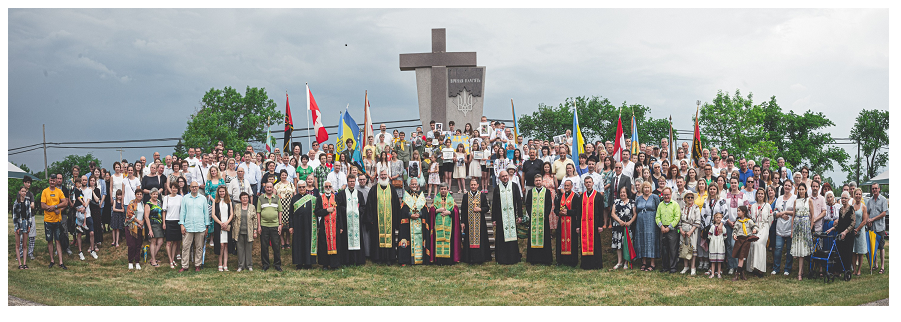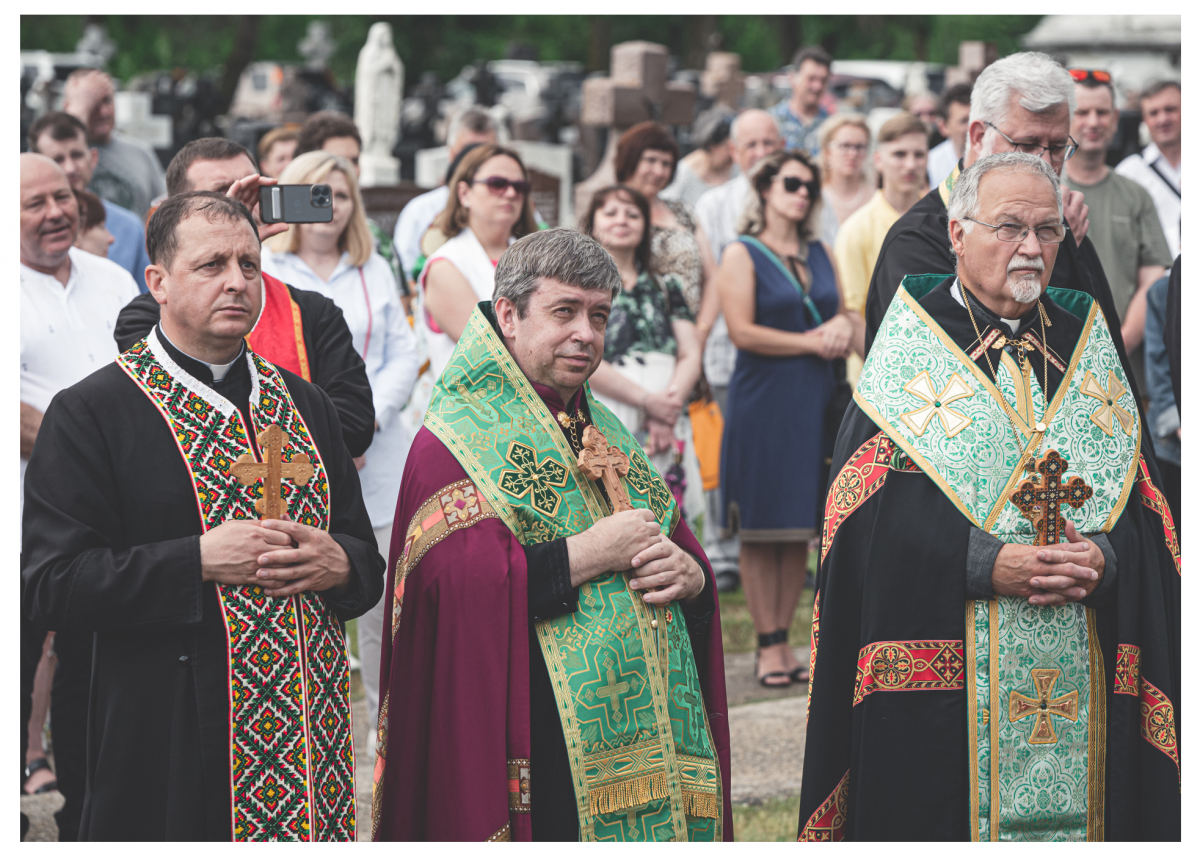WAR HEROES MOURNED ON ZELENI SVYATA
June 5, 2023
WAR HEROES MOURNED ON ZELENI SVYATA

More than two hundred Canadians joined Ukrainians displaced by the ongoing war to pray for the heroes who have died fighting for, and defending, Ukraine, led by Bishops Stefan Soroka and Andriy Rabiy and the fathers and sisters of our eparchy,
The panakhyda and short program were held at All Saints Cemetery on Sunday, June 4, 2023, on Pentecost and the traditional Zeleni Svyata commemoration of soldiers who fell in battle that was initiated by Msgr. Fr. Wasyl Kushnir in 1936.
After a brief downpour of rain on Sunday, two dozen children and youth took to the steps of "the first Sich Rifemen's Grave in Canada," holding photographs of many heroes who have died defending Ukraine in the last year, among them a son holding a photograph of his father, Andriy Sidorchenko, who died in early May, and whose belongings, but not remains, were returned to his widow, Hanna, when she went back to Ukraine from Winnipeg. Andriy Sidorchenko (1988-2023) dreamed of one day immigrating to Canada, but put that dream aside last year, to answer the call to defend Ukraine following russia's full scale invasion.
The names of the Canadians who have died defending Ukraine in the last year were read out as the children held up photographs of Émile Antoine Roy Sirois, Joseph Hildebrandt, Hryhoriy Tsekhmistrenko, Kyle Porter and Cole Zlenko, alongside framed photos of Ukrainian hero-warriors who have recently fallen on the battlefield.
Victoria Fenyuk played "Plyve Kacha" on her violin, the song that became like an anthem after the Heroes of the Heavenly Hundred were killed in Kyiv, as organizations and officials laid their wreaths. Veronika Shkindya recited the poem "Ya dyvlyusia na svitlyny biytsiv" [I look at soldiers' pictures] in memory of the fallen in battle.
Ukrainian youth, civic and veterans' organizations lowered their flags along with several flags of Canada and Ukraine, and laid wreaths at the grave, and government officials paid their respects, including Minister Andrew Smith from the Manitoba provincial government, and Councillor Shawn Dobson from Winnipeg's city council.

The memorial service was held on the site of a symbolic mass grave that was constructed and consecrated in 1936 by the man who would later become one of the founders of the Committee of Ukrainian Canadians, and the first president of the World Congress of Free Ukrainians: Msgr. Dr. Wasyl Kushnir (1893-1979).
In his homily at the consecration of the grave in 1936, Fr. Vasyl Kushnir spoke about "the unprecedented significance of this extraordinary, and first of its kind, national holiday on Canadian soil..." at the first memorial service for Ukraine's fallen heroes was held in 1936.
The words he spoke at that consecration eighty-seven years ago, could have easily been written about today:
"Throughout the history of mankind, nations have had their sons-heroes, who laid down their lives for their homeland. And our Ukrainian people have such heroes, fighters for the freedom of their native land. For all those who fell in uneven battle on land, and sea, in the air, and on the ground, for all those who defended the sanctity of our homes and our families, we dedicate this mass grave. All of these fallen heroes soared to high heaven to bring their people the freedom they had longed for across the centuries. Nothing could deter their mighty and heroic flight. The memory of the captivity in which our people languished for centuries made them stronger. We smiled in the hope that our people would become free, alongside other nation states. That hope, like a meteor, only flashed before our eyes, and our people fell into even worse captivity."
"It was at the apex of their flight that our brave riflemen were shot through their wings, and the wild enemy hordes rushed in, from all sides, to share in the spoils. We fell in battle, but we did not lose, because anyone can lose an uneven battle, but only the loser loses the war. Let this grave, erected in honor of our fallen warriors, serve as a lesson for generations to come, a lesson in faith, of love of the Almighty Creator, and of His people, the lesson of devoting oneself, even if that means making the greatest sacrifice, for that is the fire that burned in our chivalrous soldiers' hearts in the face of their heroic deaths on the battlefields of glory. Our path is clear. We dare not deviate from it for a minute. This cross raised over the grave of our fallen fighters [represents] their slanted birch crosses, their strewn bones, and the blood spilled by those who died for Ukraine."
While Kushnir did not live long enough to see Ukraine declare independence in 1991, he certainly knew what it meant to fight and die for that cause.
The memorial service in 2023 was led by Ukrainian Catholic Bishops Stefan Soroka and Andriy Rabiy, with eight co-celebrants from churches in the Winnipeg Deanery. In his sermon after the panakhyda, Bishop Rabiy honored the heroic sacrifices and examples set by generations of heroes.
After the service for the heroes, the clergy sang a panakhyda at Kushnir's grave, and prayed for the eternal memory of this great man, an Officer of the Order of Canada; in 1945, Fr. Kushnir famously traveled to San Francisco when the United Nations was being founded there, to fight the Soviets on the diplomatic front, and challenge their right to represent Ukrainians. In Winnipeg, Kushnir is beloved for overseeing the construction of the magnificent Metropolitan Cathedral of Sts. Volodymyr and Olha.

Eighty-seven years have passed since Kushnir consecrated the grave at All Saints Cemetery in the manner that Sich Riflemen's Graves were being built across Western Ukraine in the 1930s. Since then, the heroes who are honored include the men and women who fell in battle in the ranks of the Ukrainian Insurgent Army (UPA) and the First Division of the Ukrainian National Army. Now, the heroes who fought, and died, for the Armed Forces of Ukraine, join their eternal ranks.
In 1936, the veterans of the Ukrainian Galician Army who had immigrated to Winnipeg after the First World War, built the traditional burial mound as a monument to their brothers-in-arms who died fighting for Ukraine during its short-lived independence from 1917 to 1921. Over the years, the heroes who fought, and died, in the ranks of the Ukrainian Insurgent Army (UPA) and the First Division of the Ukrainian National Army were included in the prayers, which now come to include service members of the Armed Forces of Ukraine.
By Stephen Bandera, Outreach Committee, Sts. Volodymyr & Olha Parish Council
All photos by Severyn Shved more Photos on FaceBook [HERE]